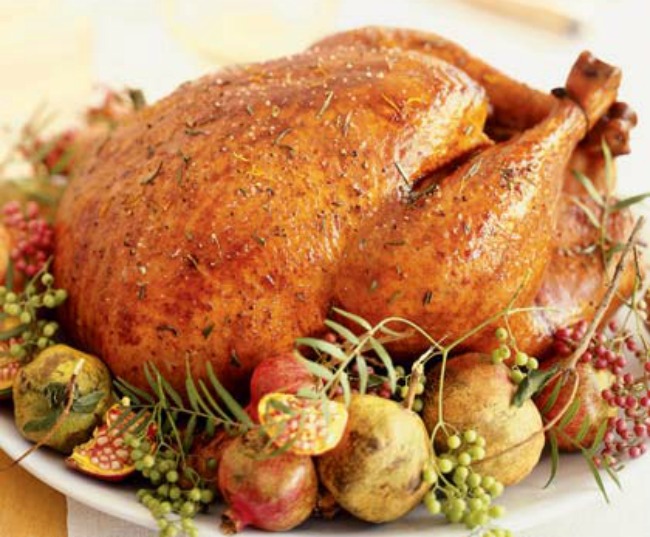
Image via Lotus Carroll/Flickr
Ah, Thanksgiving Day. You pile your plates with turkey, dressing, two kinds of potatoes, cranberries – all the traditional foods – and dig in. Second helpings? Of course! An hour later, after plenty of food and conversation, you push back and notice you’ve become very, very sleepy. You think:
I’m sleepy because turkey is high in tryptophan.
True? Or myth?
The answer is – don’t blame it on the turkey. While it’s a commonly held myth that turkey is especially high in tryptophan – and causes that drowsiness (“turkey coma”) you feel after a big Thanksgiving meal – the reality is that the amount of tryptophan in turkey is comparable to that found in chicken, beef, and other meats. In fact, turkey doesn’t result in higher levels of tryptophan in your blood than other common foods.

Happy Thanksgiving!
So why do you get so sleepy after a big turkey dinner? Post-meal drowsiness on Thanksgiving might have more to do with what else is on your plate – in particular, carbohydrates. A heavy meal rich in carbohydrates increases the production of sleep-promoting melatonin in the brain.
Melatonin is a hormone – produced in the pineal gland – that plays a role in regulating biological rhythms, including sleep. Melatonin is sold as a sleep aid. People often use it to combat jet lag when flying between time zones. Hence, “feast-induced drowsiness” — which many people across the U.S. will feel this afternoon – might be the result of a rich meal high in carbohydrates – not because of the tryptophan in turkey.
And there are other factors in post-Thanksgiving meal drowsiness including, possibly, the amount of fat in the meal (slows down the digestion), alcohol consumption, overeating and just plain tiredness from all the conversation with relatives and friends, plus the work of preparing the meal itself.
By the way, certain foods, such as soybeans, sesame and sunflower seeds, and certain cheeses, are high in tryptophan. Although it is possible these might induce sleepiness if consumed in sufficient quantities, this is not well-studied.
So enjoy your Thanksgiving meal today, and aim for a nap afterwards. Why not? Happy Thanksgiving!
Bottom line: Turkey does contain tryptophan but no more so than chicken, beef, and other meats. The drowsiness you feel after a rich Thanksgiving meal might result from the inclusion of large amounts of carbohydrates (the dressing, rolls, mashed potatoes), which increases the production of sleep-inducing melatonin in the brain. Plus the fats in the meal, alcohol, overeating and just plain tiredness all can have an effect.
Enjoying EarthSky? Sign up for our free daily newsletter today!
from EarthSky https://ift.tt/2Q8MHj1

Image via Lotus Carroll/Flickr
Ah, Thanksgiving Day. You pile your plates with turkey, dressing, two kinds of potatoes, cranberries – all the traditional foods – and dig in. Second helpings? Of course! An hour later, after plenty of food and conversation, you push back and notice you’ve become very, very sleepy. You think:
I’m sleepy because turkey is high in tryptophan.
True? Or myth?
The answer is – don’t blame it on the turkey. While it’s a commonly held myth that turkey is especially high in tryptophan – and causes that drowsiness (“turkey coma”) you feel after a big Thanksgiving meal – the reality is that the amount of tryptophan in turkey is comparable to that found in chicken, beef, and other meats. In fact, turkey doesn’t result in higher levels of tryptophan in your blood than other common foods.

Happy Thanksgiving!
So why do you get so sleepy after a big turkey dinner? Post-meal drowsiness on Thanksgiving might have more to do with what else is on your plate – in particular, carbohydrates. A heavy meal rich in carbohydrates increases the production of sleep-promoting melatonin in the brain.
Melatonin is a hormone – produced in the pineal gland – that plays a role in regulating biological rhythms, including sleep. Melatonin is sold as a sleep aid. People often use it to combat jet lag when flying between time zones. Hence, “feast-induced drowsiness” — which many people across the U.S. will feel this afternoon – might be the result of a rich meal high in carbohydrates – not because of the tryptophan in turkey.
And there are other factors in post-Thanksgiving meal drowsiness including, possibly, the amount of fat in the meal (slows down the digestion), alcohol consumption, overeating and just plain tiredness from all the conversation with relatives and friends, plus the work of preparing the meal itself.
By the way, certain foods, such as soybeans, sesame and sunflower seeds, and certain cheeses, are high in tryptophan. Although it is possible these might induce sleepiness if consumed in sufficient quantities, this is not well-studied.
So enjoy your Thanksgiving meal today, and aim for a nap afterwards. Why not? Happy Thanksgiving!
Bottom line: Turkey does contain tryptophan but no more so than chicken, beef, and other meats. The drowsiness you feel after a rich Thanksgiving meal might result from the inclusion of large amounts of carbohydrates (the dressing, rolls, mashed potatoes), which increases the production of sleep-inducing melatonin in the brain. Plus the fats in the meal, alcohol, overeating and just plain tiredness all can have an effect.
Enjoying EarthSky? Sign up for our free daily newsletter today!
from EarthSky https://ift.tt/2Q8MHj1

Aucun commentaire:
Enregistrer un commentaire